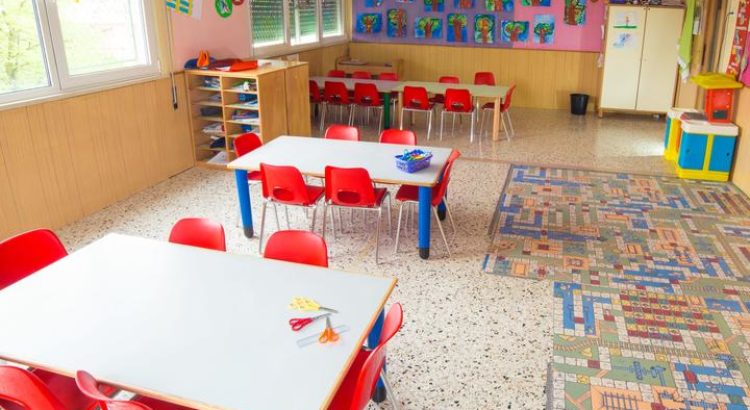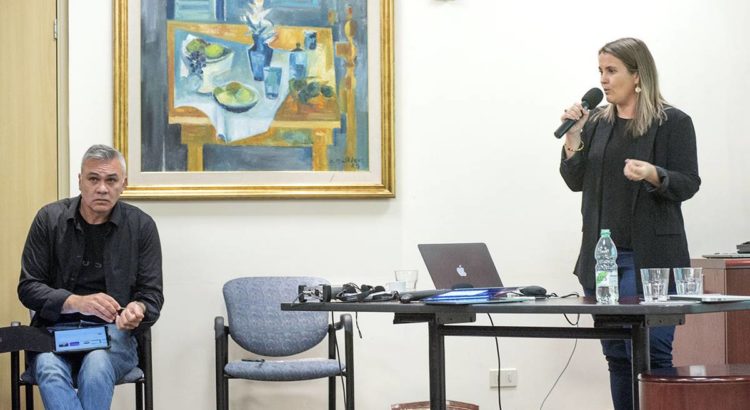Te Ākau ki Pāpāmoa es la escuela que dirige desde hace 12 años Bruce Jepsen en Nueva Zelanda, al norte de la isla. El docente tiene ascendencia maorí, una etnia polinesia que representa gran parte de la población de la isla pero que sufre mucha discriminación en la sociedad. Cuando Jepsen llegó a la escuela, 90% de los niños (maoríes y no) tenían niveles insuficientes de lectura, escritura y matemática; sin embargo, hoy los estudiantes se sitúan primeros en los rankings nacionales y los docentes exponen en conferencias internacionales. Cuenta, orgulloso, que la integración en su escuela es excelente, que todos los niños maoríes comparten su cultura sin sentirse extranjeros en su propio país, y que tanto los niños como los docentes aprenden varios idiomas, entre ellos su lengua nativa.
Jepsen llegó a Uruguay acompañado por Lynley Skiffington, la encargada de aprendizaje de alfabetización y pedagogía de la escuela neozelandesa. Además, es la directora de Estudiantes Internacionales, por lo que lidera el Programa de Segunda Lengua en Inglés, algo fundamental en una escuela que recibe una importante cantidad de estudiantes migrantes.
Los especialistas estuvieron en Montevideo invitados por la organización E.dúcate, que celebró sus diez años con la serie de charlas De.Practice: voces de una escuela efectiva, de la que los neozelandeses fueron los expositores principales. En diálogo con la diaria, los especialistas comentaron los secretos de su éxito educativo: entender la escuela como una familia en la comunidad, actualizar la currícula mediante la tecnología, y la paciencia para aceptar que los cambios en educación son lentos.
Su escuela en Nueva Zelanda tiene dos lemas: “guiándome a guiar mi aprendizaje” y “conóceme antes de enseñarme”. Comencemos por el primero, ¿qué significa esto para estudiantes y docentes?
BJ: El significado es la independencia para los jóvenes, a medida que maduran van adquiriendo la habilidad de aprender. Es una visión que busca generar capacidad a medida que avanza la currícula. Los individuos tienen su propia identidad, su propia cultura y su propio lenguaje; la guía del individuo significa generar autonomía para que, al final de estos seis años, el estudiante pueda generar su propio camino y volar hacia donde él quiera. Se relaciona con nuestro otro lema, “conóceme antes de enseñarme”: la idea es conocer realmente a cada persona con la que trabajo en profundidad; en mi caso son cientos de personas.
Eso parece ser mucho trabajo.
LS: No lo es. Es natural, porque el trabajo más importante del docente en nuestra escuela es construir relaciones con los niños. Sabemos que si como docentes logramos construir relaciones fuertes, tendremos buenos resultados y no habrá mal comportamiento en nuestras clases, porque el niño se siente a salvo y valorado. Ellos saben que nos importan, se lo mostramos y celebramos su aprendizaje.
BJ: Las malas relaciones con los estudiantes resultan en una mala enseñanza. Yo busco ese tipo de docente, que genere una buena relación, con una comunicación fluida y consistente. Cuando no está esa relación, los resultados empiezan a empeorar, comienza a haber frustración de los profesores, los estudiantes y las familias. El sistema que nosotros creamos es para todos.
¿En qué tipo de actividades se refleja este acompañamiento?
LS: Todo funciona de forma bastante orgánica, naturalmente pasa todos los días. Pero tenemos nuestras actividades particulares: cada dos semanas hacemos celebraciones escolares que son muy importantes, es un evento en el que juntamos a toda la escuela y celebramos los aprendizajes que se fueron dando en esas dos semanas. Funciona como una vitrina, una presentación de lo que está pasando en el momento, y los padres pueden participar. Es muy divertido y emocionante, y así la escuela se convierte en un centro de actividades de la comunidad. Para nosotros eso es fundamental: la escuela es comunidad y buscamos hacer nuestra mayor contribución.
¿Qué tipo de actividades se llevan a cabo en la rutina diaria?
LS: Si Bruce entra a mi clase y estoy parada delante del pizarrón y 30 niños me están mirando, se enojará. Esa situación es todo lo opuesto a lo que buscamos en la escuela, porque sabemos que ninguno de esos 30 niños está aprendiendo algo de mí ahí parada; necesitamos que los niños estén haciendo cosas, así funciona el aprendizaje.
BJ: Dejamos que los niños sean niños, pero sabemos lo que esperamos de ellos y los ayudamos a hacerlo. Para eso necesitamos a los mejores profesores, que sepan cómo liderar ese aprendizaje; no podemos poner delante un títere que repita como un grabador, eso no ayuda al niño a conocerse a sí mismo.
¿Cuál es el rol de la familia en la escuela?
LS: Tenemos una enorme relación con los padres. Nuestra escuela es como una gran familia, todos estamos conectados y vamos en el mismo camino. El aprendizaje no se detiene en el momento en que el niño sale de las puertas de la escuela, sino que continúa en sus casas. Tenemos una herramienta digital que se llama Seashore [un software privado, de Apple], y a través de ella todos los padres están conectados al perfil individual de su hijo, y el maestro puede comunicarse directamente con el padre, quien puede responder, y todos pueden escribir mensajes en la comunidad del grupo o de la escuela. Y todos lo hacen, se conectan y participan en el aprendizaje del niño a diario.
BJ: Aprovechamos cualquier oportunidad de comunicarnos con los padres que tengamos. Puede ser accidental; cuando dejan al niño en la puerta los agarramos un minuto para conversar, pero no tiene por qué haber algo para decir, sólo conversar para construir una relación que tenga en el centro el aprendizaje del niño más allá de la escuela. Siempre tratamos de ofrecerles a los padres el consejo y la guía necesaria para que ellos nos ayuden a nosotros en las tareas de educación. A su vez, los padres y los docentes también están involucrados con lo extracurricular. Todos mis docentes y algunos padres están involucrados en las actividades extracurriculares de los niños: algunos están asociados a talleres de música, otros son entrenadores de básquetbol o rugby; están relacionados con todo lo que hace a la comunidad.
Hace una década, la escuela tenía pésimos resultados, los niños no pasaban las pruebas de escritura y lectura, mientras que ahora están en lo más alto de los rankings nacionales. ¿Cómo fue ese proceso?
BJ:Tiene que ver con las altas expectativas. Me enfoqué en enseñar una pedagogía significativa y en darle sentido al aprendizaje. Es importante que los docentes y estudiantes tengan un propósito, por eso soy muy sincero sobre lo que espero que hagan los docentes. Los primeros años fueron muy difíciles: tuvimos que evaluar cómo estaba el nivel de la escuela, al mismo tiempo que iba eligiendo los docentes más comprometidos con el cambio, porque necesitaba profesores que confiaran en mi visión para empezar a trabajar. Fuimos construyendo toda esta cultura de trabajo y fue muy difícil porque el progreso es muy lento, por eso creo que es importante celebrar los pequeños pasos que vamos logrando. Cuando alguien siente que está haciendo las cosas bien, quiere seguir. Ese es el cambio, creer en los niños, asumir que esos malos resultados no son los normales y trabajar para mejorarlos. Hay que saber que lleva mucho mucho trabajo: yo tenía cabello negro y ahora sólo tengo canas, imaginate el tiempo y el esfuerzo que llevaron estos cambios.
¿Cuáles fueron los primeros pasos?
BJ: Fue generar una base de datos, ver exactamente dónde estábamos y proyectarnos los seis años en todas las áreas del currículum. Evaluamos y vimos que no éramos buenos en ninguna área; sin sorpresa los datos que vimos eran muy malos. Elegimos profundizar en las habilidades de lectura, profundizamos en que los profesores supieran más al respecto. Lo hicimos porque muchas de las cosas de la currícula requieren saber leer y comprender, y nuestros estudiantes no estaban alcanzando ese nivel básico. Entonces fueron dos años enfocados exclusivamente en la lectura; también avanzamos en otras áreas, claro, pero estábamos concentrados en la lectura comprensiva. En estos primeros años también aparté a los docentes que no estaban comprometidos, los probamos y si no estaban en la escuela por la misma razón que estábamos los demás se tenían que ir, porque no eran parte de la familia. Yo valoro a los docentes que siguieron con nosotros durante todo el camino difícil.
¿Cómo se llevan estos cambios con el sistema educativo neozelandés?
BJ: Parte de mi visión fue pensar cómo salimos del sistema. Llegamos a lo máximo de sus expectativas en lectura, escritura y matemática, pero no usamos la construcción tradicional del conocimiento. Lo que hicimos fue tomar la currícula neozelandesa y digitalizarla; hacemos actividades tradicionales pero con una lavada de cara digital, las llevamos al tiempo real en el que vivimos. El gobierno no nos ayudó para nada en nuestra conversión; lo hicimos nosotros, nuestra comunidad trabajando muy duro. Empujamos los límites y creamos cosas que apenas podíamos imaginar: tenemos a niños grabando canciones en estudios de grabación profesionales, tenemos docentes dando conferencias a audiencias mundiales y que son líderes en sus áreas. Lo creamos creyendo en nosotros y en los niños.
La cultura maorí es parte muy importante de la escuela. ¿Qué rol juega?
BJ: Tiene un rol masivo, muy importante. Yo soy indígena y mi acercamiento al liderazgo incluye siempre la cultura maorí, está en mi forma de ser. Nosotros vemos al planeta como parte de nosotros, somos la naturaleza y manejamos eso, hay un término, whakahanongatanga, que significa “conectividad” y “sentido de la comunidad”; eso es fundamental en nuestra comunidad indígena y es lo que yo transmito en mi escuela, requiere generar soporte y cariño en la comunidad y es lo que yo quiero que mis docentes transmitan a los niños.
¿Hay muchos estudiantes maoríes en la escuela?
BJ: Cerca de 35%, unos 300 estudiantes más o menos. Vienen desde 37 diferentes lugares, algunos incluso se han mudado desde otras regiones sólo para ir a nuestra escuela, porque los indígenas solemos ser muy desplazados en nuestra sociedad, nos dejan de lado en muchos lugares, y en esta escuela nunca será así. En otras escuelas los niños maoríes tienen malos resultados, pero en mi escuela tienen los mejores del país y esto es porque confiamos en ellos, porque no los subestimamos.
Nueva Zelanda desde Uruguay
Cecilia de la Paz es la directora general de E.dúcate y comentó algunos de los motivos para invitar a estos exponentes desde Nueva Zelanda. “En su escuela ellos tienen un proceso mucho más dinámico que el nuestro. Es posible que haya muchos docentes trabajando con el mismo grupo: cada niño se relaciona con varios docentes y tiene varios espacios de aprendizaje durante el día. Cada uno es específico, pero a su vez están intercomunicados, no hay una división estricta entre un momento y el otro. El docente crea un ecosistema de aprendizaje durante el día y el niño lo cruza. En el trasfondo hay docentes diseñando todo, pero para el niño es sólo pasear por distintos lugares, es mucho más holístico de lo que parece. Ves niños que van y vienen, y parece que ellos están caminando por ahí, pero todos están haciendo lo que tienen que hacer, sin que haya un mandato”.
Fuente: https://educacion.ladiaria.com.uy/articulo/2019/7/la-escuela-de-nueva-zelanda-que-aposto-al-concepto-de-comunidad-y-logro-revertir-malos-resultados/













 Users Today : 69
Users Today : 69 Total Users : 35460200
Total Users : 35460200 Views Today : 98
Views Today : 98 Total views : 3418881
Total views : 3418881